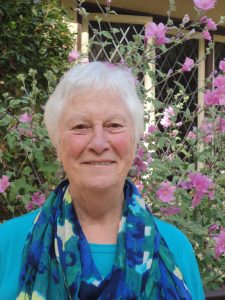- All
- Wisdom
- We Stand on Their Shoulders
- Vocation
- Uncategorized
- Stories Seldom Heard
- Spirituality
- Social Justice
- Prayer
- Peace
- Oneness
- Love
- Letting Go
- Lent
- Joy
- Inspirational Images
- Hope / Healing
- Holy Week
- Gratefulness
- God's Presence
- General News Stories
- Forgiveness
- Finding God
- Faith
- Easter
- Dominican Saints
- Discipleship
- Courage
- Christmas
- Catholic Sisters Week
- Care of the Earth
- Blessing
- Beauty
- Advent
- #justiceOPportunity
Sheltering in Place
Sr. Patricia Bruno, OP

Stories Seldom Heard
250th Edition May 1, 2020
My Dear Friends,
 Welcome to Stories Seldom Heard. If we were not sheltering-in-place, we would be welcoming into our Stories Seldom Heard Community new friends who had made the retreat at Santa Sabina Retreat Center in San Rafael, CA.
Welcome to Stories Seldom Heard. If we were not sheltering-in-place, we would be welcoming into our Stories Seldom Heard Community new friends who had made the retreat at Santa Sabina Retreat Center in San Rafael, CA.
Truly this is a very different time in our lives. Yet, in a very real way I feel more connected with all of you because of our isolation. A strange response? Perhaps not. Each of you is part of the Stories Seldom Heard Community – both far and near. Meeting you has made a difference in my life. Your lives, stories and concerns are in my daily prayers. Presence can be experienced in a variety of ways.
Certainly “presence” during this “sheltering time” has been expressed by letters, phone calls, zoom meetings, face time, to name just a few examples. Our participation in Holy Week liturgies, daily Eucharistic celebrations, spiritual exercises and prayer services continue to not only give us a wide lens that connects us with the Catholic world communities, but also reminds us that God is present to each of us no matter where we are or how we pray.
As Catholics, we miss the physical presence of our daily/weekly church community. Not being able to be physically present to celebrate the Eucharist together and receive the Body and Blood of Christ; not being able to visit with friends and chat about the activities of our days, and not being able to plan or evaluate the successes of our parish education programs and events, have deepened our appreciation of community. For many people, these voids have awakened or reignited a deep hunger for the sacraments. They also make us poignantly aware of how privileged we are. I say “privileged” because often, we take for granted the ease with which we can gather in prayer and celebrate the sacraments in our local parishes.
As we look around the world community, our experiences during this shelter-in-place have stirred within us a deep appreciation of the sacraments and our Eucharistic communities. They have also awakened in us our concerns for the larger church. Many of us might have been too busy to notice the significant Pan-Amazon Conference in October 2019 that Pope Francis convened. The Conference focused on the serious environmental conditions in the Amazon region. There are nearly half a million indigenous people from twenty nationalities who live there. It is one of the most bio-diverse places on the face of the Earth. Yet, as we know the brutal industrial exploitation of the area has irreversible global implications. The rape of the environment affects the health not only of the region, but also of the world.
The Conference also discussed the spiritual hungers and the crucial need for more ordained ministers in the region. The complex geography, inadequate transportation routes, enormous number of Catholics, and the lack of ordained ministers have led to serious spiritual concerns. In Puerto Maldonado, Peru, Pope Francis met with those who represented the three million indigenous people. Puerto Maldonado, where the Apostolic Vicariate is located, has an inadequate number of active priests to serve over 450 large and small villages. Tragically, these statistics reveal the profound spiritual hungers of the people. It’s obvious that many villagers in outlying jungle areas can only participate in the Eucharist once or three times a year.
Why do I comment on Pope Francis’ and the bishops’ Pan-Amazon Conference while we are sheltered-in-place? Hopefully, we might have time to read and reflect on some of the questions raised and the results of the Conference. The critical environmental questions affect all of us. Also, as we experience our longing for our faith communities and the sacraments, our minds and hearts might be more open to those who for years have practiced their faith without the opportunity, as we have, to receive the sacraments on a regular basis. By studying the contents of this Conference, we might be further awakened to the precarious situation of our environment, as well as the needs of our world church community.
With this world view in mind and remembering that as children many of us prayed “A Morning Offering,” I would like to suggest this “Morning Offering” for these times. We could pray this “Morning Offering” for ourselves and the world. Father Pierre de Chardin, S. J.’s prayer is as poignant for us now, as it was for him then.
Since once again, Lord,…I have neither bread, nor wine, nor altar, I will raise myself beyond these symbols….I will make the whole earth my altar and on it will offer You all the labors and sufferings of the world. Over there, on the horizon, the sun has just touched with light the outermost fringe of the eastern sky. Once again, beneath this moving sheet of fire, the living surface of the earth wakes and trembles, and once again begins its fearful travail. I will place on my paten, O God, the harvest to be won by this renewal of labor. Into my chalice I shall pour all the sap which is to be pressed out this day from the earth’s fruits (1).
Our isolation has not only deepened our gratitude for the many gifts of life we experience every day, but also has opened our minds and hearts to those who are in need of daily bread to feed their families. Each day we hear of creative and conscientious business owners and ordinary people like ourselves who have pledged resources to help the larger community. Yesterday, today and tomorrow we must continue to fill our parish food pantries, send dinners to our first responders and make regular phone calls to those who are living alone or ill. These are practical ways to nourish others and participate in the healing of those who are suffering as a result of our present situation. In a very real way, we become daily bread for others. Our actions and prayers become the bread that enables people to face each day.
Karl Rahner, a Jesuit priest and theologian, reminds us of the blessings that come at the end of the day when we live intentionally. He says when we begin each day, “even though it (the day) is bound to bring the same old strain and the same old burden…(with) the old Christian saying: in the name of God,” our evenings will be filled with blessings. So perhaps after we pray our Morning Offering, we might continue our prayer “courageously, cheerfully and with confidence: in God’s name. In the name of the strong God, who is the quiet strength of the weak….In name of the merciful God who desires our peace, patience, and friendliness…May all be done -both great and small – in the name of God” (3). May our evening prayer celebrate the movements of the Holy Spirit in each decision of the day.
- Pierre Teilhard de Chardin S.J., Hymn of the Universe, Harper and Row Publishers, 1961.
- Karl Rahner, S.J., The Mystical Way in Everyday Life, Orbis Books, Maryknoll, NY, 2010, Page 190.
“Stories Seldom Heard” is a monthly reflection written by Sister Patricia Bruno, O.P., a Dominican Sister of San Rafael, California. This service is offered to the Christian community to enrich one’s personal and spiritual life. The articles can be used for individual or group reflection.
